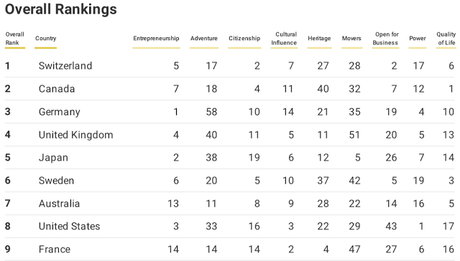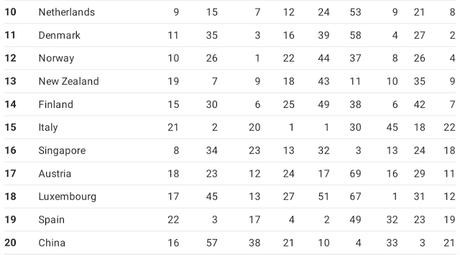


The U.S. News & World Report has issued it's Best Country List for 2018. Switzerland remained in first place, followed by Canada and Germany. The United States dropped to eighth (from seventh in last year's list).
Countries are judged in each of nine categories, and then ranked in each category. The lower the score on the chart above (which shows the 25 best countries), the better.
Here's how they describe their methodology:
The subrankings, their weights in calculating the overall ranking score and the country attributes factored into each are below. The country attribute scores were equally weighted within each subranking. Subranking weights do not add up to precisely 100.00 due to rounding. Adventure (3.24 percent): friendly, fun, pleasant climate, scenic, sexy Citizenship (16.95 percent): cares about human rights, cares about the environment, gender equality, progressive, religious freedom, respects property rights, trustworthy, well-distributed political power Cultural Influence (12.93 percent): culturally significant in terms of entertainment, fashionable, happy, has an influential culture, modern, prestigious, trendy Entrepreneurship (17.42 percent): connected to the rest of the world, educated population, entrepreneurial, innovative, provides easy access to capital, skilled labor force, technological expertise, transparent business
practices, well-developed infrastructure, well-developed legal framework Heritage (3.17 percent): culturally accessible, has a rich history, has great food, many cultural attractions Movers (10.00 percent): different, distinctive, dynamic, unique Open for Business (11.99 percent): bureaucratic, cheap manufacturing costs, corrupt, favorable tax environment, transparent government practices Power (7.42 percent): a leader, economically influential, politically influential, strong international alliances, strong military Quality of Life (16.89 percent): a good job market, affordable, economically stable, family friendly, income equality, politically stable, safe, well-developed public education system, well-developed public health system To arrive at a country's rank, we first calculated its standardized scores for each of the 65 country attributes. Each country received nine subranking scores by averaging its scores for the country attributes grouped into that subranking. A country's overall score reflects the weighted sum of its subranking scores. The subranking and overall scores were rescaled so that the top country in each category received a value of 100, and others were calculated as a proportion of that top score. Scores were ranked in descending order.

